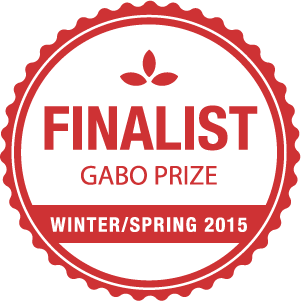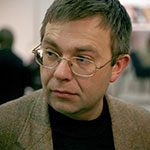Five Poems
The language of Aesop eludes me,
and it’s too late to be taught a new tongue;
whether they’re villains, reprobates, or robbers,
I’m used to calling the powers
that be—with no provisos, no thought
for rank or title—by their actual names.
I won’t thin complicity among the many,
or inflate an individual shame.
Passer-by, be advised: give me a wide berth!
Only your feet now can save you.
For it is not the earth’s verdict
I’m calling down here—it is God’s.
When the defense and D.A. conspire
together, one witness gathers Himself
to judge: see His face flame with righteous ire,
see His robes effulgent with truth.
From the tree of earthly fear I eat no seeds,
from the waters of fright I’ve not drunk,
for this is Caesar’s portion I spurn.
I’ve filled my belly with other things.
So you, little whimperer, flee now!
Hightail it out of here, make haste,
lest animals swathed in sermon silk attack.
Your heels will feel the hot breath of beasts.
Every Day
Each and every day, save weekends and holidays,
when there’s no reason or special occasion
to leave my apartment and head downtown,
the same underground train—racing at insane speeds, its
unbearable rattling and grinding, screeching
and shrieking, clanging and clawing that’s fit
to flay my eardrums to the bone—carries us past
the exact spot between two stations, Avtozavodskaya
and Pavelstskaya, where a friend, not my nearest
or dearest, but a quiet man and loving father,
the kind that’s daily more endangered, always willing
to go drinking and a book-lover to boot,
the kind whose hard work never won him a penny,
Borya Geliebter (speak his name in your prayers, ye who live!),
was blown to bits in that explosion on the sixth
of February, in the two thousand and fourth year
of our Lord, on a Friday, at thirty-two minutes
past eight, as he was commuting in the morning
rush hour, without the slightest notion that he—
the poor guy, just fifty-four days shy
of his forty-third birthday—was slated to land
(oh senseless fate!) in tragedy’s messy center; and then
a host of thoughts comes into my head, from furious
curses—“Let those who gave this sordid order,
and those who (aware of their actions) still acted,
find no peace in this life or the next;
whether they rest in cold graves or hot beds may they
get no response, for a special retribution awaits their souls!”—
to humble thoughts of heaven’s hidden works,
which reason can’t fathom nor human dimensions measure,
since our births as men, our lives and ends,
reside in the Creator’s hands, who always calls
his blessed back with “Blessed be those beloved to me!”—
to vague ruminations on things foreboding:
how, if the philosopher of the common task is correct
and the resurrection requires numerical data, here’s where
you’ll find it, thus proving (despite a certain thinker’s bitter claim)
that after Auschwitz and the Gulag, after bloody wars
and revolutions, after Hiroshima, Baghdad and New York, there can be poetry…
but what kind? Who’s to say, maybe this kind right here.
In Memory of East Prussia
I.
Everything here’s alien: storks in their nests—
habit led each one here—
the everyday earth, the air’s everyday breath,
the everyday water.
Formed by some separate kind of god
there’s this heaven, the fields sliced just
right, and a sun to scorch these winding roads
and kick up their dust.
Here the roosters sing off key, crickets
chirr improperly, and strange is the screech
of foliage, growing thickest
on oak, lime, or birch branch.
Built by bellicose Teutons,
an antique castle’s a cast-wax skull.
However much its emptiness saddens
you, it’ll never again be full.
Of everything around me, seen and unseen, the one
deep law cannot be known—
so too did barbarians, astride Rome’s ruins,
think everything alien.
II.
The ruin’s tongue is unintelligible:
the Livonian’s no longer around—
these countless lacunae stand out,
bright against the black background.
Both first sketch and final signature
emerge from under the paint—
sad denouement that hunts
you out, no matter what you want.
On the orphaned pedestal
falls a lone shadow;
There are finer points and details
we’re too lazy to dig through.
Cobwebs now cover
the pond’s dusty mirror;
as a mother mourns her sons,
so the sons their father.
III.
“As for the truth that one day we’ll die,
the trees here wept clear amber,
back when nothing yet could portend
that those called out—i.e. you and I—
from the dark ether on God’s orders
would suit up for living…” The elegy’s begin-
ning is severed—but to prolong it, ah!
my head’s inspiration-less,
and I’ve not endeavored to drag line after line
for some time now. Gently a wave—
the Golden Fleece’s curly heiress—
floats the fossilized tears to the coastline.
IV.
For how many years has this clock-
face’s 5:30 been rusted fast—
time’s left the station.
Chronicler! Take up your coal and chalk
to mark the day more attentively. Dab your brow sweat.
All other options
elude you. So quickly now, note this
little testament—just take it down, don’t
try to fathom it.
For the seagull’s shrill voice
greets everything that’s in the earth, or
by the earth begot.
V.
The sandy hills of the Curonian Spit,
seeded with dragon’s teeth, cleave
the sea’s elastic lap in two turbulent
halves; the Spit’s been seeded.
As usual the men arose bristling.
They awoke to discord, then strained
to straighten, like gnarled pines striving
against the frenzied elements; now they remain,
a thin strip of woods, overcast and sullen.
So it was, and so it shall be.
My blood freezes; I realize we’re kin.
I too was sown senselessly.
VI.
A bridge, nowhere-bound,
spans a loathsome stream;
the waters ceased their babble,
feigning lethargy.
Not a single trail remains
since there’s nothing to decide.
This spreading meadow’s still green,
uncut by time’s sure scythe.
The shades take their leisure
with picnics in that vale;
wherever they gambol
they trample spring petals.
Memory and oblivion—two
shores—make one.
I’ve not crossed the bridge,
but linger in-between.
VII.
An old photographer wanders, aluminum
tripod in tow, raking the beach vainly for one
who’d wish herself pictured against a horizon
of belted pines or crags of sand, but—as if to spite him—
no one’s to be found; nobody needs anything—
not the countless tourists, each equipped
with Polaroids and Kodaks—and it’s no staggering
aggravation, though regret, nonetheless, seeps
in. Shoeless, taciturn, he passes the trash-heaps
of people, dividing his feet between sand and surf.
He’s filled with sorrow, which is my sorrow,
leaving no tracks as he goes forth.
Of all gilded Apollo’s adopted sons
surely you’re the last and most beloved!
Abandon that tripod and photograph heaven—
the sea, the sun, radiating from its altitude!
“You Take Root in Earth”
You take root in earth; I trot blithely by,
humming some happy tune
(all by my lonesome) about how,
as your gold leaves fall, you grow
more irresistible, though you’re neither
dead nor living.
You seek help, little misery’s daughter,
but what help, poor dear, might I provide?
The death pangs attending
your final hour are just like high art, though
they refuse to be captured in sculpture,
speech, pigment, or song.
You dwindle down to nothing,
while those buds, which bring no good
to fruition, sit fallow—
Are you the fig our Savior damned,
or the walnut that, well before Christ’s birth,
Ovid cursed in a split verse?
“A Many-Throated, Many-Mawed, Many-Tongued Rumble”
A many-throated, many-mawed, many-tongued rumble
resounds, coming nigh, soaring high, casting wide,
to infuse each soul with horror, wrap it in fear like a shroud,
setting all, from the dead to the unborn, atremble:
What’s happening? What’s coming? What’s gone?
And the cosmos’ uncountable creatures now feel
a light on their transparent skin, transmitted
from an immutable mote, so tiny even a keen eye
can’t pinpoint it in the maelstrom of faces and events—
but it holds our questions’ answers, and our hope.
![]()
Языком эзоповым не владея
Языком эзоповым не владея,
потому что поздно учить язык,
нечестивца, вора или злодея
власть имущих – собственными привык
называть именами без оговорок,
невзирая на звания и чины,
сопричастности не деля на сорок,
не преувеличивая вины.
Обходи меня стороной, прохожий!
ибо только ноги тебя спасут, –
нет, не человечий на них, но Божий
постоянно я призываю суд,
где защитник и обвинитель слиты
воедино, свидетель – и тот один,
пламенеют гневом Его ланиты,
свет сияет истины от седин.
Я со древа страха земного зерен
не вкушал и не пил боязни вод
кесарю назло, как бы ни был черен
или бел, – иным наполнял живот,
посему, дрожащий, как можно прытче
от меня беги, не жалея пят,
а не то, напялив личины притчи,
за спиною хищники засопят.
Каждый божий день, кроме выходных и праздничных
Каждый божий день, кроме выходных и праздничных,
когда без надобности особой смысла нет
из дому выдвигаться в сторону центра,
с невыносимым скрежетом, скрипом, сипом,
визгом и лязгом, царапающим и дерущим насквозь
барабанные перепонки, на сумасшедшей скорости
поезд подземный привычно проносит меня
мимо того самого места, между “Автозаводской”
и “Павелецкой”, где моего приятеля, не из близких,
тихого человека и семьянина, каких ещё поискать,
собутыльника мирового и страстного книжника,
ни гроша не стяжавшего честным себе трудом,
Борю Гелибтера (помяни в молитвах имя его, живущий!)
разорвало в куски во время взрыва шестого
февраля две тыщи четвёртого года от Рождества
Христова, в пятницу, в тридцать две минуты девятого,
едущего на работу в утренний час пик,
не подозревая, что ему, бедолаге, за пятьдесят четыре
дня до сорокатрёхлетия в самое средоточье
угодить (о случайность бессмысленная!) суждено,
и приходят мне в голову то проклятия гневные:
“Тем, кто отдал, не дрогнув, страшный приказ, и тем,
кто, сознавая и ведая, что творит, исполнил,
пусть не будет покоя ни на том, ни на этом свете,
ни в холодных могилах, ни в жарких постелях телам
их не спится, а душам готовится кара сугубая!” —
то смиренные мысли о том, что непостижим
человеческому разумению небесный промысел тайный
и к нему подступаться с мерой земной бесполезно,
что рождение смертных, жизнь и кончина в руках
у Творца, всех блаженных Своих обратно зовущего:
“Да пребудет благословен возлюбленный мной!” —
то предчувствия смутные, мол, если общего дела
философ окажется прав и точнейших данных
для грядущего воскрешения понадобится цифирь,
можно будет её почерпнуть отсюда, и в опровержение
горьких слов иного мыслителя доказать,
что поэзия после Освенцима и ГУЛАГа, кровавых
революций и войн, Хиросимы, Багдада, Нью-Йорка
может быть, но какой? — кто знает, — возможно, такой.
ПАМЯТИ ВОСТОЧНОЙ ПРУССИИ
I
Здесь все чужое: аисты на гнездах,
привычкой занесенные сюда,
обычная земля, обычный воздух,
обычная вода.
Сотворены другим каким-то богом
и небеса, и дольние поля,
и солнце, по извилистым дорогам
пылящее, паля.
Здесь петухи поют не так, не этак
кузнечики стрекочут, странен скрип
густой листвой отягощенных веток
дубов, берез и лип.
Основанный воинственным тевтоном
старинный замок – череп восковой.
как ни тоскуй о безвременьи оном,
не сганет головой.
Всего, что зримо мне и что незримо,
таинственный закон непостижим, –
так варвару среди развалин Рима
казалось все чужим.
II
Язык руин не внятен:
ливон не вышел вон, –
немало белых пятен
легло на черный фон.
Проступят из-под краски
и надпись и чертеж, –
трагической развязки
дождешься – ждешь не ждешь.
Стоит на пьедестале
осиротелом тень;
в подробности, в детали
вникать, вдаваться лень.
Затянет паутина
зерцало озерца,
но матери без сына,
что сыну без отца.
III
“О том, что мы когда-нибудь умрем,
деревья здесь рыдали янтарем,
когда еще ничто не предвещало,
что вызванные из небытия
велением Господним – ты и я –
сберемся жить…” – Элегии начало
оборвано, – ее продлить, увы!
нет вдохновения, из головы
не тщусь тянуть по строчке и подавно,
пока выносит на берег волна,
курчавая наследница руна
златого, плач окаменелый плавно.
IV
Полшестого на проржавелом
циферблате который год, –
время выбыло.
Летописец! углем и мелом
дни, со лба утирая пот,
ибо выбора
нет, прилежнее отмечай-ка,
не пытаясь понять, внемли
завещаньице, –
то приветствует криком чайка
все, что в землю иль из земли
возвращается.
V
Усеяны густо зубами дракона
песчаные горы на Куршской косе,
делящей бурливое надвое лоно
упругого моря, – усеяны все.
В урочное время по всем косогорам,
разбужены распрей, они прорастут,
согбенными соснами встав под напором
стихии безумной, – останутся тут
полоскою леса, угрюмой и хмурой.
Так было, так будет, – из жара да в дрожь
при мысли: на них несуразной фигурой,
на прошлых и будущих, сам я похож.
VI
Мост, ведущий в никуда
чрез ручей смердящий:
говорливая вода
притворилась спящей.
Ни тропинки никакой,
ибо жребий брошен, –
луг, уверенной рукой
времени не кошен.
В праздник там, на том лугу,
веселятся тени,
разбивая на бегу
чашечки растений.
Память и забвенье – два
берега – едины:
мост не перейден едва
мной до середины.
VII
Старый фотограф с треножником из дюрали
бродит по пляжу тщетно в поисках тех,
кто пожелал бы снимок на фоне дали
Бельта ли, гор ли песчаных, но – как на грех –
никого: никому ничего не надо, –
отдыхающих тыщи снабжены
кодаками, поляроидами – не досада
неимоверной, но сожаление – глубины.
Бос, молчалив, минуя свалку людскую,
он по песку одной, по волне другой,
полон тоской, которой и я тоскую,
не оставляя следов, ступает ногой.
Из сыновей приемных златого Феба
самый последний – самый любимый ты!
брось свой треножник, фотографируй небо,
море и солнце, блещущее с высоты.
Ты в землю врастаешь, – я мимо иду
Ты в землю врастаешь, – я мимо иду,
веселую песенку на ходу
себе под нос напевая
про то, как – теряя златые листы –
мне кажешься неотразимою ты,
ни мертвая, ни живая.
Ты помощи просишь, страдания дочь, –
мне нечем тебе, бедняжка, помочь:
твои предсмертные муки
искусству возвышенному сродни,
хоть невпечатлимы ни в красках они,
ни в камне, ни в слове, ни в звуке.
Сойдешь на нет, истаешь вот-вот, –
благой не приносящие плод
пускай не расклеятся почки,
поскольку ты – смоковница та,
которую проклял еще до Христа
Овидий в раздвоенной строчке.
Гул многоустый, многоязычный, многогортанный
Гул многоустый, многоязычный, многогортанный,
вширь раздаваясь, вглубь проникая, ввысь устремляясь,
души живущих ужасом полнит, страхом объемлет,
в трепет приводит всех от умерших до нерождённых:
что происходит? что исчезает? что возникает?
Вся во Вселенной тварь ощущает плотью сквозною
проникновенный свет, исходящий из ниоткуда,
из неподвижной точки ничтожной, зоркому глазу
неразличимой в круговороте лиц и событий,
но и ответы в нём на вопросы есть и надежда.
Translators’ Note
Our collaborative translations began as a novelty but became an extension of family. We started making them in 2009 when Anne—in Moscow on an NEH Collaborative Research Fellowship for three months—met Maxim Amelin, an “archaist innovator” of a poet, whose clever neologisms and classical leanings deserve to be better known in English. A scholar of Soviet literature by training, Anne had only ever translated prose. A poet and translator of Latin, Derek had no experience with Russian verse. And yet we were both game for a challenge, newly married and eager, we suppose, to attempt a union of literature to follow our union of love. So we set to work, slowly carrying one Amelin poem after another into English, using—in Jascha Kessler’s description of collaborative translation—a “method, which is really quite simple, and hardly a method at all.” Anne picked the poems, wrote the cribs, and glossed terms, tropes, and themes, festooning the poems like Spanish moss. Derek massaged the whole packet back into sonorous verse. And then we’d talk, and talk, and talk some more.
If this setup sounds like a test of marital communication, it was, at least for a time. While the Soviet satirical duo Il’f and Petrov, much translated by Anne, could complain that “writing together isn’t twice as easy, it’s ten times as hard,” how much more difficult is translating together, when there are three minds in the mix? Still, collaboration’s challenges are little different from those faced by any translator translating alone: what’s the line between sound and sense? There’s always going to be some nuance or artful consonance that will vanish, and as Joanna Trzeciak recently wrote, “translation is the art of choosing one’s regrets.” If we, as collaborative translators, are bound to admit and explain those regrets, we’re at least buoyed by a partner who comprehends and empathizes with the loss. And the final product benefits from two attention spans and two sets of eyes. To put it another way, we are the team of relay sprinters who’ve snuck into a marathon, pacing ourselves against life’s other exhaustions. In 2010, we became parents of a son. Now four years old, he speaks both Russian and English, hearing the former from his mother, the latter from his dad. If these translations are for anyone other than Amelin, they are surely for him.








